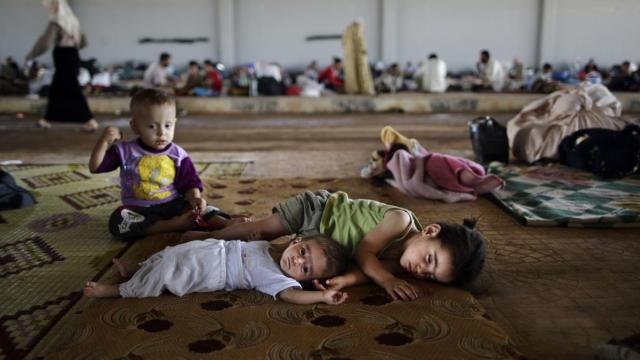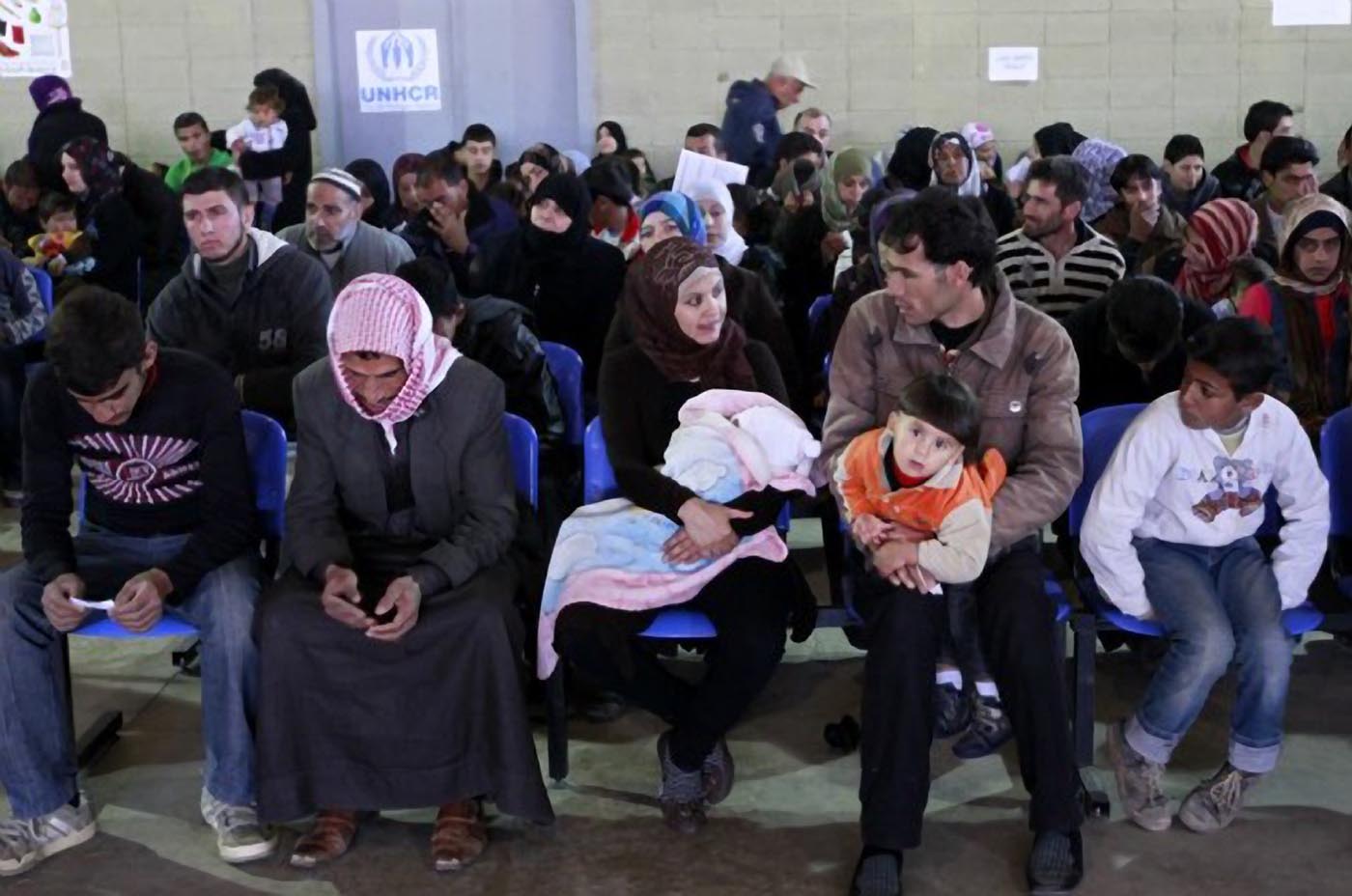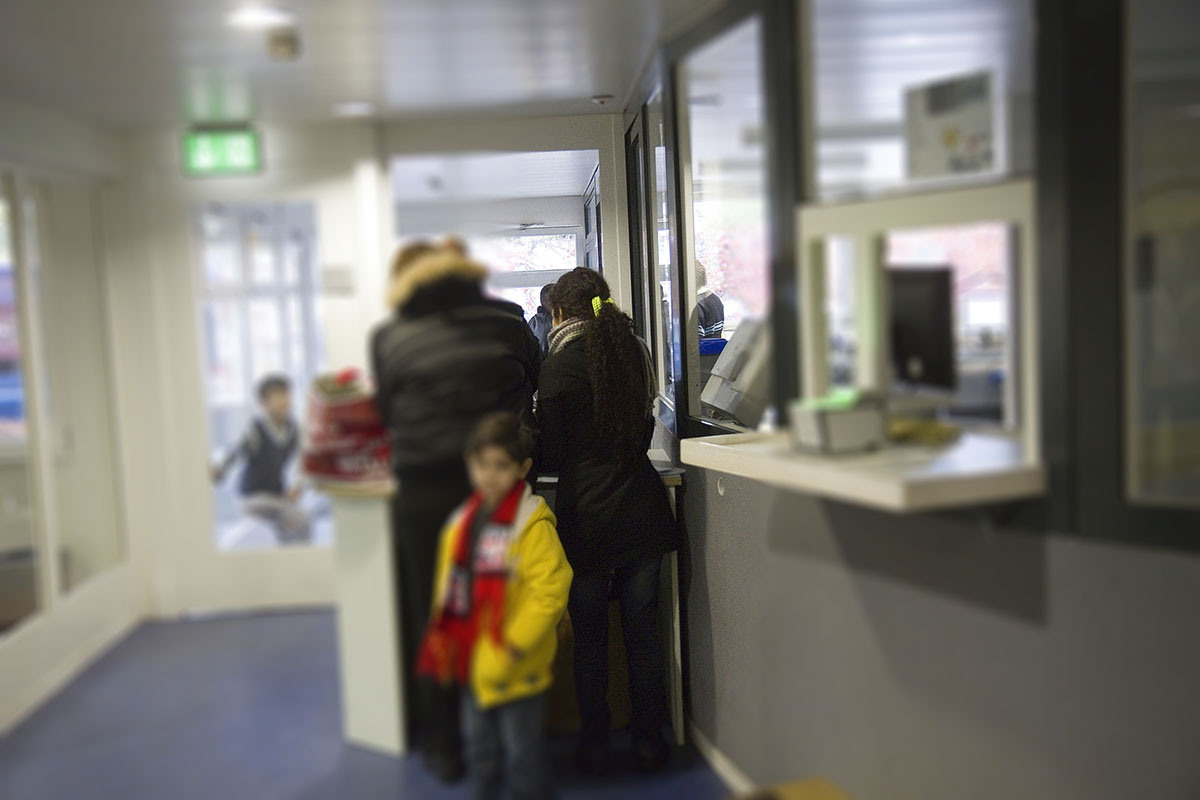
BERN, Switzerland — Due to Syria's civil war and the refugee crisis it has produced, the political standoff between asylum-seekers in Switzerland and the government body tasked with deciding their status — the Bundesamt für Migration (BFM), or Federal Migration Office — has in the last week become a standoff in a very real sense.
Since September 9, Syrian refugees impatient with what in many cases has been the BFM’s years-long lack of response to their needs have been braving the autumnal chill in an improvised camp in front of the office’s main building in Bern. Eleven of the upwards of 100 demonstrators began a hunger strike on Saturday.
The asylum-seekers — many of whom have been in Switzerland since the onset of the Syrian revolution in 2011, or longer, and around 40 of whom are children — have resolved not to leave until their status is officially decided.
Over the course of the week, the camp has been growing as more Syrian refugees, largely from the Kurdish region of the country, have arrived from all over Switzerland to join the struggle. Most have come with little more than the clothes on their backs and the blue F- or N-permits issued to them upon their initial registration with the BFM.
A local migrants’ advocacy network, Kollektiv Bleiberecht, helped garner attention for the group early last week and donations of tents, sleeping mats, blankets, food and money have been trickling in.
As U.S. Secretary of State John Kerry and Russian Foreign Minister Sergei Lavrov stood before cameras in Geneva on Saturday to announce a tentative pact between their countries regarding the crisis in Syria, in Bern the Syrian asylum-seekers accompanied by a smattering of local supporters marched from the BFM to the Swiss House of Parliament to ask why this crisis of international proportions has factored so little into resolving their status.
Years of Waiting, No Work, No School
The march was headed by children from the camp, one of whom sat on his father’s shoulders and gleefully led chants, in German using a megaphone, like, “We love Switzerland but Switzerland doesn’t love us.” The moving spectacle went almost unnoticed by locals as the march wound its way through quiet neighborhoods and empty parklands along the police-approved route, from the far-flung BFM towards the Bern city center.
The children's plight was repeatedly mentioned in three brief speeches made by movement delegates in front of the Parliament’s west wing. Their predicament, said speakers, pointed up the deep injustice of the BFM’s foot-dragging. An F- or N-permit — the ‘temporary’ document a newly-arrived refugee holds while his or her case is being processed — not only prevents asylum-seekers from working, arranging their housing or even obtaining a SIM card from a Swiss cellular provider, but also prevents their children’s registration in the local school system.
“These children want to go to school. If they could, they would go tomorrow,” intoned Helin, a young Syrian woman who has been in Switzerland for five years and has what is known as a B-permit (non-permanent residence). She has been working as a translator and liaison for the activists. “Look at them, they have a life, they have rights," she said of the children. "Give them a future.”
In limbo – No Answers, No Exit
Returning to the camp for a collectively cooked meal, several demonstrators described their disappointment, frustration and worry. Adnan, a man in his twenties who escaped to Turkey seven months ago, then flew to Switzerland to join his brother who had fled in 2011, said in his address at the Parliament building that other European countries have begun to grant blanket asylum to Syrian refugees.
“But my brother applied for asylum here over a year ago, and has heard nothing,” he said on the walk back. “No answer.” Around us, children struck up a particularly biting chant on the theme: “Thank you Sweden!" "Thank you Germany!”
Abdullah, on the other hand, did not come to Switzerland because of family — in fact, his wife and three children are still in Syria, and he has had virtually no contact with them for the last two years, partly due to the limitations on his F-permit. Abdullah chose Switzerland, he said, because of its reputation for hospitality and democracy.
“But it’s not democracy unless everyone can speak," he said. "This country is a prison. I can’t even go to a real democracy. I tried to go to Germany, and was deported back here. Have you heard of Dublin?”
He was not referring to the city, exactly. The Dublin Regulation was adopted by EU member states in 2003, and Switzerland signed on to it as a non-member in late 2008. It stipulates that the country an asylum-seeker first enters is the country responsible for him or her. This has been particularly problematic for EU-periphery countries through which the greatest number of refugees enter, and where the bureaucratic and social infrastructure handling the load is frequently ill-equipped to do so.
Greece has been a headline-grabbing example of this in recent years, as the confluence of the Eurocrisis and the Arab Spring has led to a spectacular rise in racist violence and a proliferation of draconian detention centers for migrants there.
A Long, Hot Summer: Tensions Rise in the Swiss Immigration Debate
That Switzerland, clearly far from the "periphery" in both the geographic and the economic sense of the word, is demonstrating similar incompetence and hostility in these matters should be shocking to many. But so far no amount of outcry — from asylum-seekers themselves nor from international media — seems to be making much of an impression on Swiss authorities, or to be resonating with an outspokenly anti-immigrant Swiss public.
In mid-August, a small group of asylum-seekers from various countries including Afghanistan, Egypt and Syria attempted what could be seen as a precursor to the current protest in Bern. Of 12 men who were brought to live in a newly converted nuclear bunker in Canton Solothurn, 10 refused to stay, finding the cramped, windowless underground quarters inhumane. They camped in protest at the Solothurn train station for four nights, and reportedly had to sleep in shifts in order to protect themselves against harassment from townspeople.
Ultimately the 10 were removed by police and split up, each taken to separate lodging around the region — explicitly to prevent the group from further organizing. “These 10 asylum-seekers will not be rewarded for their behavior,” an official from the Cantonal Security Office told the newspaper Blick at the time. “They will see they have only damaged their image and that of all asylum-seekers.”
Swiss authorities have meanwhile been damaging their own image as well. Also in August, news broke that the town of Bremgarten, Canton Aargau, would be forbidding asylum-seekers who were newly housed in military barracks there from entering certain areas of the city. Local authorities reportedly contacted the BFM about their plans and imposed the restrictions with the federal office’s blessing.
An international furor erupted, with rights groups including the United Nations High Commissioner for Refugees accusing Switzerland of violating international law. News of "apartheid" in Bremgarten was reported in multiple news outlets including Time, the BBC and The Guardian.
Local authorities appeared unperturbed at the time; Bremgarten Mayor Raymond Tellenbach said in various interviews that the measures were intended to prevent conflict in the community. BFM spokeswoman Gaby Szöllösy meanwhile presented her office’s toleration of the controversial measures as a compromise. She explained in an interview with The Guardian that since the law allows federal authorities to assign lodging for asylum-seekers to communities without their consultation, those communities deserve some leeway to decide how to deal with the imposition that is being placed on them.
No Assurances — and No End in Sight
Under increasing pressure both from outside Switzerland and from the estimated 48,000 people who arrived here seeking asylum in 2013 alone, the BFM’s response to the Syrians’ current protest has so far been characteristically ambivalent.
As of this writing, representatives from the BFM, including its director, Mario Gattiker, have met twice with a delegation from the Syrians’ protest camp, but have so far not shown any sign of budging. They maintain, according to the Bern newspaper Der Bund, that Syrian asylum-seekers who arrived in 2009 or earlier will receive a decision on their status by the end of the year. As for those arriving since 2010, they give no assurances.
Beat Meiner, General Secretary of the NGO Swiss Refugee Council, told Der Bund that the BFM’s hands are more or less tied due to years of “wrong-headed politics” concerning refugees in Switzerland. The BFM has simply been allotted too few resources and personnel to handle the growing caseload, he said. And the tendency of late — judging by the debates around a recent Asylgesetzrevision, or tightening of the asylum law, which happened first in Parliament and then in a public referendum passed in June — is to squeeze them even further.
“We accept rules, we accept that this is a difficult situation,” Adnan said during his speech at the demonstration Saturday. “But we will stay until we have gotten an answer, yes or no, which is our right. It is the least we can ask.”
BFM representatives will reportedly meet with the Syrian delegation for a third time this week. But without a significant turnaround in public sentiment — and without pressure in the political sphere to untie the BFM’s hands — it seems unlikely a resolution will be reached. And in the meantime, the standoff continues.
3 WAYS TO SHOW YOUR SUPPORT
- Log in to post comments















